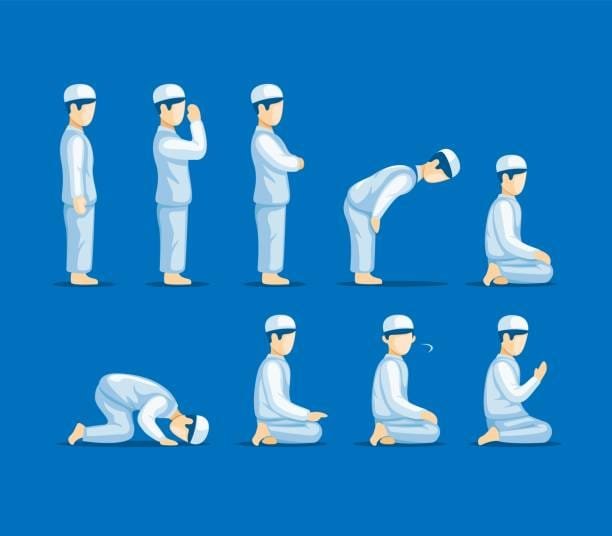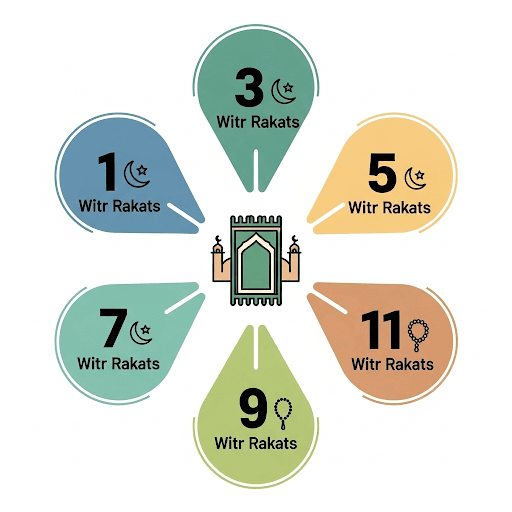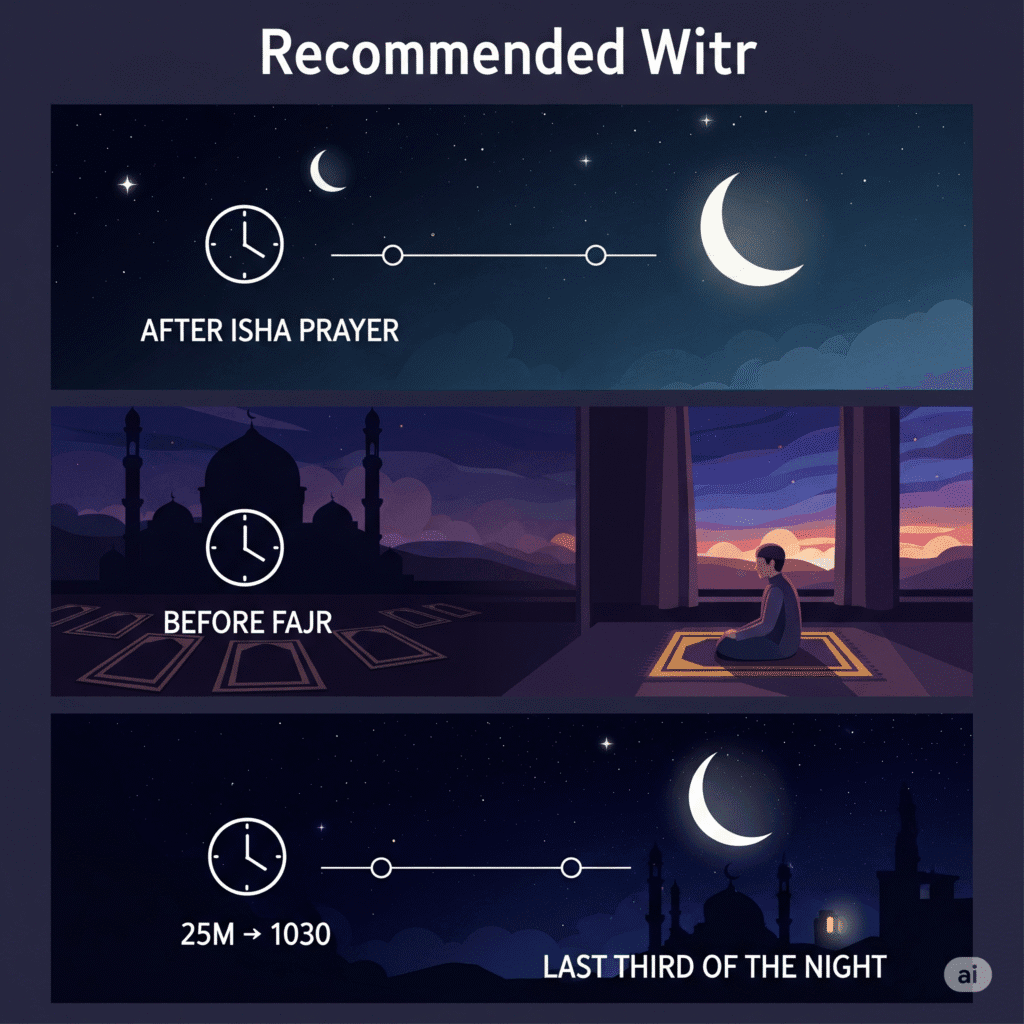Starting With The Name Of Almighty Allah
Witr Salah is more than just the final prayer of the day; it’s a meaningful expression of devotion performed in odd rakats. Performed after the obligatory Isha prayer and before Fajr, it serves as a spiritual conclusion to the day’s worship, offering a moment to seek Allah’s mercy and guidance. This comprehensive guide explores the Witr prayer method, its significance, and answers common questions like What is Witr prayer?, Rakats in Witr Prayer, and When should you pray Witr? Whether you’re new to Islam or seeking to refine your practice, this blog will provide clarity on Praying Witr Salah, including its connection to Witr Prayers in Isha and Witr Prayers with Tahajjud.
The Importance of Witr Salah

Witr Salah is a highly revered act of worship that draws Muslims closer to Allah. Its significance is underscored by the Prophet Muhammad (peace be upon him), who never abandoned it, even during travel. The prayer’s importance is highlighted in a hadith:
“Allah has prescribed for you a prayer (by which He may increase your reward), which is Witr; Allah has enjoined it for you during the time between Isha prayer until dawn begins” (Sunan al-Tirmidhi).
Scholars differ on its status, with the Hanafi school considering it Wajib (obligatory) and others (Shafi’i, Maliki, Hanbali) classifying it as Sunnah Mu’akkadah (confirmed Sunnah). Regardless, neglecting Witr is discouraged, as it is a means to earn immense spiritual rewards and seek forgiveness.
Learning the correct method of praying Witr Salah requires proper guidance and authentic knowledge rooted in the Quran and Sunnah. Many Muslims today prefer studying under a trusted Online Quran Academy where qualified teachers explain Salah rulings step by step with clarity.
Step-by-Step Guide to Praying Witr Salah
The Witr prayer method varies slightly across Islamic schools, but the most common practice involves three rakats. Below is a detailed guide to Praying Witr Salah:

- Niyyah (Intention): Silently intend, “I intend to pray Witr Salah for Allah.”
- First Rakat:
- Begin with Takbir (“Allahu Akbar”).
- Do Sana and Recite Surah Al-Fatiha, followed by a short surah (e.g., Surah Al-Ikhlas).
- Perform Ruku (bowing), saying “Subhana Rabbiyal Azeem.”
- Stand, saying “Sami’ Allahu liman hamidah, Rabbana lakal hamd.”
- Perform two Sajdahs (prostrations), saying “Subhana Rabbiyal A’la” in each and stand up.
- Second Rakat:
- Recite Surah Al-Fatiha and another Surah.
- Perform Ruku and Sajdahs as above.
- Sit for Tashahhud, recite Attahiyat, and stand up.
- Third Rakat:
- Recite Surah Al-Fatiha, followed by another surah.
- Before Ruku, raise hands saying Takbeer and recite Dua-e-Qunoot afterwards and stand up.
- Perform Ruku and Sajdahs as above.
- Perform two Sajdahs.
- Tashahhud and Taslim:
- Sit for Tashahhud (reciting Attahiyat).
- Conclude with Taslim (“As-salamu alaykum wa rahmatullah” to the right and left).
Variations: Some schools suggest praying two rakats with Taslim, then a single rakat separately. The majority, however, pray three rakats continuously with one Taslim.
What Is Dua-e-Qunoot?
Dua-e-Qunoot is a supplication recited in the third rakat of Witr, after Ruku and before Sajdah, particularly in the Hanafi school. It is a heartfelt plea for Allah’s guidance and protection. The dua is:
اللَّهُمَّ إِنَّا نَسْتَعِينُكَ وَنَسْتَغْفِرُكَ وَنُؤْمِنُ بِكَ وَنَتَوَكَّلُ عَلَيْكَ وَنُثْنِي عَلَيْكَ الْخَيْرَ، وَنَشْكُرُكَ وَلَا نَكْفُرُكَ، وَنَخْلَعُ وَنَتْرُكُ مَنْ يَفْجُرُكَ، اللَّهُمَّ إِيَّاكَ نَعْبُدُ
وَلَكَ نُصَلِّي وَنَسْجُدُ وَإِلَيْكَ نَسْعَى وَنَحْفِزُ، وَنَرْجُو رَحْمَتَكَ، وَنَخْشَى عَذَابَكَ، إِنَّ عَذَابَكَ بِالْكُفَّارِ مُلْحِقٌ
Transliteration: Allahumma inna nasta’eenuka wa nastaghfiruka wa nu’minu bika wa natawakkalu ‘alayka. Wa nuthnee ‘alaykal khayr, wa nashkuruka wa laa nakfuruka. Wa nakhla’u wa natruku man yafjuruka. Allahumma iyyaka na’budu wa laka nusalli wa nasjudu wa ilayka nas’aa wa nahfizu. Wa narju rahmataka wa nakhshaa ‘adhaabaka. Inna ‘adhaabaka bil kuffaari mulhiq.
English Translation: “O Allah! We ask You for help, and beg for Your forgiveness. We believe in You, and we trust in You, and we praise You with all that is good. We thank You and are not ungrateful to You. We cast off and forsake those who disobey You. O Allah! You alone we worship, and to You we pray and prostrate. For You we strive and work. We hope for Your mercy and fear Your punishment. Indeed, Your punishment is bound to reach the disbelievers.”
In other schools, Dua-e-Qunoot is optional or replaced with other supplications like:
اللَّهُمَّ اهْدِنِي فِيمَنْ هَدَيْتَ، وَعَافِنِي فِيمَنْ عَافَيْتَ، وَتَوَلَّنِي فِيمَنْ تَوَلَّيْتَ، وَبَارِكْ لِي فِيمَا أَعْطَيْتَ، وَقِنِي شَرَّ مَا قَضَيْتَ، إِنَّكَ تَقْضِي وَلاَ يُقْضَى عَلَيْكَ، وَإِنَّهُ لاَ يَذِلُّ مَنْ وَالَيْتَ، وَلاَ يَعِزُّ مَنْ عَادَيْتَ، تَبَارَكْتَ رَبَّنَا وَتَعَالَيْتَ.
Transliteration: Allahumma ihdini fiman hadaita, wa ‘afini fiman ‘afaita, wa tawallani fiman tawallaita, wa barik li fima a’taita, wa qini sharra ma qadaita, innaka taqdi wa la yuqda ‘alayk, wa innahu la yadhillu man walaita, wa la ya’izzu man ‘adaita, tabarakta Rabbana wa ta’alaita.
Translation: O Allah, guide me among those You have guided, grant me safety among those You have granted safety, take me into Your care among those You have taken into Your care, bless me in what You have given, and protect me from the evil of what You have decreed. Indeed, You decree, and none can decree against You. He is not humiliated whom You befriend, nor is he honoured whom You oppose. Blessed are You, our Lord, and Exalted.
Number of Rakats in Witr Prayer
Witr Prayers in Isha are separate, performed after Isha and before Fajr. Rakats in Witr Prayer must be an odd number, as the term “Witr” means “odd.” The most common practice is 3 rakats, but 1, 5, 7, or 9 rakats are also permissible, depending on time and devotion. The Witr prayer stands alone, separate from the Isha prayer, which itself comprises 4 Fard and 2 or 4 Sunnah rakats. For a detailed breakdown, including Sunnah and Nafl rakats, see How Many Rakats in Isha Prayer?.
If you’re unsure about the variations in rakats across different schools of thought, exploring structured Online Quran Courses can provide clear insights from experienced instructors. Many people find that joining Online Quran Courses helps them practice Witr more confidently by breaking down the fiqh differences step by step.

Can Witr Prayer Be Offered with 5 or 7 Rakats?
Yes, Rakats in Witr Prayer can be an odd number: 1, 3, 5, 7, or 9. The Prophet (peace be upon him) prayed Witr with varying rakats, as narrated by Aishah: “The Messenger of Allah used to pray thirteen rak’ahs at night, praying five rak’ahs of Witr” (Sunan Abi Dawud). While 3 rakats is most common, 5 or 7 are permissible for those seeking additional devotion.
Can I Pray Just One Rakah?
Yes, praying one rakat for Witr is allowed, especially if time is short before Fajr. The Prophet (peace be upon him) said, “If anyone is afraid of the approaching dawn (Fajr prayer), he should pray one rak’ah and this will be a Witr for all the rak’at which he has prayed before” (Sahih Bukhari).
Since there are different scholarly opinions regarding the number of rak‘ahs and recitation in Witr Salah, learners often benefit from structured Online Quran Classes. These classes help students understand fiqh differences and practice prayer correctly according to authentic teachings.
Is Witr Wajib or Sunnah?
The status of Witr Prayers is debated among scholars:
- Hanafi School: Views Witr as Wajib (obligatory), meaning missing it is sinful. A hadith states, “Witr is a duty for every Muslim” (Sunan Abi Dawud).
- Shafi’i, Maliki, Hanbali Schools: Consider Witr as Sunnah Mu’akkadah (confirmed Sunnah), highly recommended but not obligatory. Ali (may Allah be pleased with him) said, “The Witr prayer is not required like your prescribed prayers, but it is the Sunnah of the Messenger of Allah” (Sunan al-Tirmidhi).
What Difference Does It Make If Witr Is Wajib or Sunnah Mu’akkadah?
If Witr is Wajib, missing it requires making it up (Qada), and intentional neglect is considered sinful. If it is Sunnah Mu’akkadah, it is strongly recommended to perform it and missing it is not sinful but results in the loss of a very big reward. Imam Ahmad emphasised, “Whoever neglects Witr is a bad man whose testimony should not be accepted”, underscoring its importance in either case.
When Should You Pray Witr?
The time for Witr Prayers begins after Isha and ends before Fajr. The Prophet (peace be upon him) recommended delaying Witr to the last third of the night if one is confident in waking up, as prayers at this time are witnessed by angels (Sunan al-Tirmidhi). However, if you fear missing it, pray Witr after Isha. Abdullah ibn Umar reported, “Make the last of your prayers at night the Witr prayer” (Sahih Bukhari).

Can I Pray Witr with Tahajjud?
Yes, Witr Prayers with Tahajjud are ideal, as Witr should be the last prayer of the night. If you perform Tahajjud (voluntary night prayer), pray Witr afterwards. The Prophet (peace be upon him) advised, “The Witr prayer is offered in units of two raka’at. If you fear that dawn is near, conclude with a single rak’ah” (Sahih Bukhari). This ensures Witr seals your nightly worship.
Maintaining consistency in prayers like Witr becomes easier when a person continues improving their understanding of Salah and Islamic rulings. Through reliable Online Quran Learning, Muslims can strengthen their worship, correct mistakes, and build a stronger connection with Allah.
Ahadith on Witr Salah
The following hadiths highlight the importance and flexibility of Witr Salah:
| Hadith | Source | Summary |
| “The night prayer is offered as two rak’at followed by two rak’at and so on, and if anyone is afraid of the approaching dawn (Fajr prayer), he should pray one rak’ah and this will be a Witr for all the rak’at which he has prayed before.” | Sahih Bukhari | Allows one rakat for Witr if time is short. |
| “The Messenger of Allah used to pray thirteen rak’ahs at night, praying five rak’ahs of Witr, in which he would not sit except in the last rak’ah.” | Sunan Abi Dawud | Shows flexibility in rakats (e.g., 5 for Witr). |
| “My friend (the Prophet S.A.W) advised me to do three things: to fast three days every month, to pray two rak’at of Duha, and to pray Witr before sleeping.” Abu Hurayrah (may Allah be pleased with him). | Sahih Bukhari | Emphasizes Witr’s regular practice. |

Common Mistakes and Tips
To enhance your Witr Salah experience, avoid these pitfalls:
- Rushing: Perform each rakat with focus and humility (khushu).
- Skipping Dua-e-Qunoot: Ensure you recite it if following the Hanafi school.
- Incorrect Timing: Aim for the last third of the night, but don’t risk missing it.
For personalised guidance, consider enrolling in Online Quran Classes in USA at Najam Academy, where expert instructors teach the Witr prayer method and other Islamic practices with precision.
Conclusion
Witr Salah is a profound act of worship that enriches a Muslim’s spiritual life. Whether you pray one, three, or more rakats, the key is sincerity and consistency. By understanding its timing, method, and significance, you can make Witr a cherished part of your nightly routine. Explore resources like Quran Majeed Blog or join Online Quran Classes at Najam Academy to perfect your practice. May Allah accept your prayers and guide you in your worship. Ameen.




